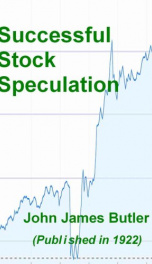Successful Stock Speculation

selections from the first few chapters: CHAPTER I. THE PURPOSE OF THIS BOOK This book is written for the purpose of giving our clients some ideas of the fundamental principles that guide us when we select stocks for them to buy, but these principles are valuable to every person who trades in listed stocks or in any other kind of speculative stocks. First of all, we want you to get a clear conception of the meaning of the word speculation, which is explained in the next chapter. Our purpose is to protect you against losses as well as to enable you to make profits, and it is very important that you understand how to provide for safety in your speculating. It is a well known fact that there are tremendous losses in stock speculation, but we claim that almost all of these losses would be avoided if all speculators were guided by the principles expounded in this book. "What" and "When" are two very important words in stock speculation, and we cannot urge upon you too strongly to study carefully Chapters V. to IX.[8] Chapters X. to XV. tell you much about the influences that affect the prices of stocks, a knowledge of which should also be a guide to you in making your selections. Perhaps the most important chapter in the entire book is XXV., on Market Information. A careful reading of this chapter should convince you that much of the prevailing information about the stock market is misleading. That fact alone accounts for many of the losses in stock speculation. It has been our aim to state all facts briefly. The entire book is not long, and it will not require much of your time to read it through carefully. We are sure you will get many ideas from it that will help you. - CHAPTER II.WHAT IS SPECULATION? To speculate is to theorize about something that is uncertain. We can speculate about anything that is uncertain, but we use the word "speculation" in this book with particular reference to the buying and selling of stocks and bonds for the purpose of making a profit. When people buy stocks and bonds for the income they get from them and the amount of that income is fixed, they are said to invest and not to speculate. In nearly all investments there is also an element of speculation, because the market price of investments is subject to change. "Investment" also conveys the idea of holding for some time whatever you have purchased, while speculation conveys the idea of selling for a quick profit rather than holding for income. To the minds of most people, the word "speculation" conveys the thought of risk, and many people think it means great risk. The dictionary gives for one of the meanings of speculation, "a risky investment for large[10] profit," but speculation need not necessarily be risky at all. The author of this book once used the expression, "stock speculating with safety," and he was severely criticized by a certain financial magazine. Evidently the editor of that magazine thought that "speculating" and "safety" were contradictory terms, but the expression is perfectly correct. Stock speculating with safety is possible. Of course, we all know that the word "safety" is seldom used in an absolute sense. We frequently read such expressions as: "The elevators in modern office buildings are run with safety." "It is possible to cross the ocean with safety." "You can travel from New York to San Francisco in a railroad train with safety." And yet accidents do occur and people do lose their lives in elevators, steamships, and railroad trains. Because serious accidents are comparatively rare, we use the word "safety."
Info about the book
Author:
Series:
Unknown
ISBN:
0910019703
Rating:
4.5/5 (3)Your rating:
0/5
Languge:
English
Users who have this book
Users who want this book
What readers are saying
What do you think? Write your own comment on this book!
write a commentGenre
if you like Successful Stock Speculation try:
Other books by this author
Do you want to exchange books? It’s EASY!
Get registered and find other users who want to give their favourite books to good hands!

